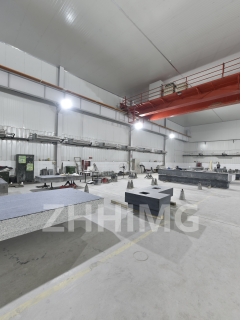Granite precision apparatus assembly is a popular method of constructing high-precision measurement and inspection equipment. This manufacturing method involves using granite as a base for the assembly, which is then fitted with various components to create a highly accurate and stable platform. While this method has many advantages, it also has some disadvantages which need to be considered when choosing whether to use this method. In this article, we will explore the advantages and disadvantages of granite precision apparatus assembly.
Advantages
1. High Stability: Granite is an ideal material for a base because it is extremely hard and stable. This means that it can withstand vibrations and other disturbances without affecting the accuracy of the measuring instrument.
2. High Accuracy: Granite is a highly uniform material, meaning that it has a consistent density and homogeneity throughout the piece. This makes it an excellent material for precision measuring instruments and other applications where accuracy is critical.
3. Weather Resistance: Granite is a naturally occurring material that is resistant to temperature variations, moisture, and most other weather-related conditions. This makes it an excellent choice for outdoor applications, such as surveying or construction.
4. Durability: Granite is an exceptionally hard material that resists wear and tear. This makes it an excellent choice for applications where the equipment will be subjected to harsh conditions or frequent use.
5. Low Thermal Expansion: Granite has a very low coefficient of thermal expansion, which means that it will not contract or expand significantly with temperature changes. This makes it an ideal material for applications where temperature control is critical.
Disadvantages
1. Cost: The biggest disadvantage of granite precision apparatus assembly is the cost. Granite is an expensive material, and the cost of fabricating and assembling precision instruments on a granite base can be significantly higher than other materials such as steel or aluminum.
2. Heavy Weight: Granite is a dense and heavy material, which can make it difficult to move or transport. In addition, the weight of the granite base can limit the size and portability of the precision apparatus.
3. Limited Design Flexibility: Because granite is a natural material, the size and shape of the base are limited by the size and availability of the source material. This can restrict the design flexibility of the precision apparatus, compared to other materials such as steel or aluminum.
4. High Maintenance: Granite requires regular cleaning and maintenance to maintain its smooth surface. This can be time-consuming and expensive, especially if the precision apparatus is located in a harsh environment.
Conclusion
In conclusion, granite precision apparatus assembly has significant advantages in terms of accuracy, stability, durability, weather resistance, and low thermal expansion. However, it also has some disadvantages in terms of cost, weight, design flexibility, and maintenance. When considering whether to use granite as a base material for precision instruments, it is essential to balance the benefits against the costs and limitations of this material. Despite its disadvantages, granite remains a popular choice for high-precision instruments in many industries due to its unmatched stability and accuracy.
Post time: Dec-22-2023

